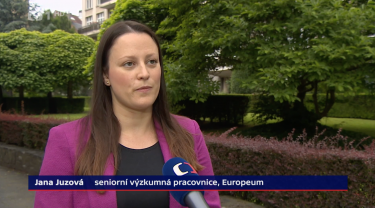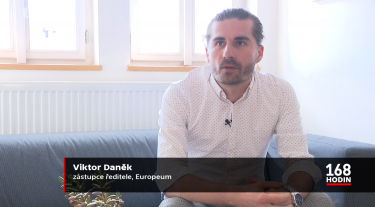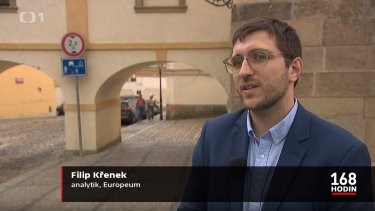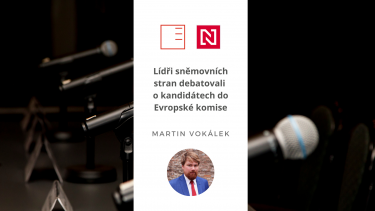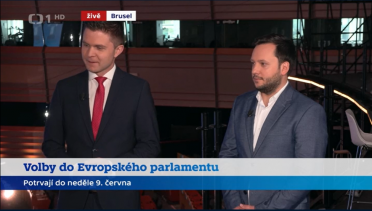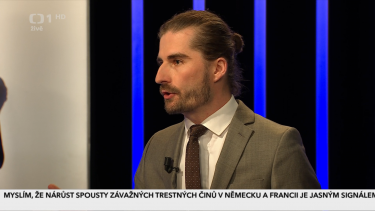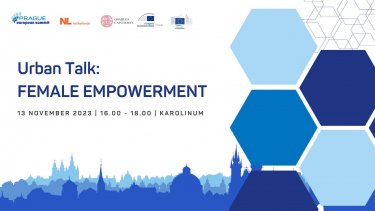Události ČT | Accession talks between Ukraine and Moldova and the EU
The European Union has initiated accession talks with Ukraine and Moldova. This decision was preceded by two years of negotiations. The accession process is expected to take several years. Jana Juzová, a senior researcher at the EUROPEUM Institute, commented on the topic for Evening News on Czech Television.
Show moreČT24 | Czechs voted for the European Parliament. How was the campaign?
For the fifth time Czech voters choose their representatives to the European Parliament. Almost 700 candidates competed for 21 seats. What did they offer and what was the campaign like? Viktor Daněk, deputy director of EUROPEUM Institute for European Policy, comments for Czech Television's investigative programme 168 hodin.
Show more168 hodin | Who is the surprise of the European election?
Filip Turek, originally an outsider, pulled the Přísaha and Motorists coalition into third place and gained more than ten percent of the vote. He bet on a ban on internal combustion engines and social networks. How realistic are his election promises? Who did he take votes from and who helped him? Filip Křenek, Project Coordinator and Analyst at EUROPEUM Institute, commented on the topic for Czech Television's investigative programme 168 hodin.
Show more
Deník N | Leaders of parliamentary parties debated about candidates for the European Commission
On Czech Television, the leaders of all parliamentary parties clashed in a debate full of crucial topics ahead of the European elections. In the end, the discussion focused on key European issues, such as the portfolio of the Czech Republic in the European Commission. The debaters also presented their favorites for candidates to the European Commission. Martin Vokálek, Executive Director of EUROPEUM Institute, commented for Deník N.
Show more
ČT24 | The European Union is in a state of unity, despite differences among some member countries
The European Parliament elections held from June 6th till 9th not only introduced a new lineup of MEPs but also brought significant changes in the distribution of seats among various countries. The European Union is gearing up for new challenges with its new leadership, and Hungary will assume the presidency in July. How will the European institutions transform, and what priorities will dominate over the next five years? Žiga Faktor, Deputy Director and Head of the Brussels Office of EUROPEUM Institute, commented for Czech Television.
Show more
Máte slovo | Migration Pact
Will the migration pact make it compulsory for the Czech Republic to accept refugees? Will the pact limit the flow of refugees into Europe? Viktor Daněk, deputy director of the EUROPEUM Institute, discussed this on Czech Television's programme Máte slovo.
Show more168 hodin | Czech and Slovak relations at freezing point
Due to the pro-Russian positions of Slovak Prime Minister Robert Fico, the Czech cabinet suspended the intergovernmental consultations. Does this turn the former brothers into enemies? Nonetheless, this is not the first time that relations between these two nations, that used to share a common state once, have frozen. Viktor Daněk, deputy director of the EUROPEUM Institute, commented on the topic in an investigative piece for 168 hodin broadcast by Czech Television.
Show moreRTVS | Summit of V4 Prime Ministers in Prague
Czech Prime Minister Petr Fiala and Polish Prime Minister Donald Tusk met separately ahead of the Visegrad Group summit in Prague, where the main points of discussion were the war in Ukraine and energy security. Vít Havelka, an analyst at EUROPEUM Institute, commented on the position of the Hungarian or Slovak Prime Minister and the overall direction of the Visegrad Group for Slovakian television RTVS.
Show more
INVITATION | Urban Talk: Female Empowerment
We would like to invite you to a debate on "Female Empowerment" that is organized as a part of the Prague European Summit. The debate will take place on Monday, 13th of November 2023, from 16:00 in Karolinum.
Show moreČT24: Under Ursula von der Leyen's leadership, the European Commission has succeeded in meeting more than ninety percent of its priorities
Ursula von der Leyen delivers her last State of the Union speech of her term today. Our researcher Klára Votavová responded to questions from the Czech Television about the speech.
Show moreStaroměstské náměstí 4/1
Prague 1 - Staré Město
110 00
tel.: +420 212 246 552
email: europeum@europeum.org
https://www.europeum.org
